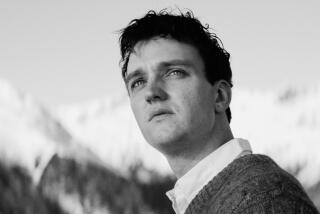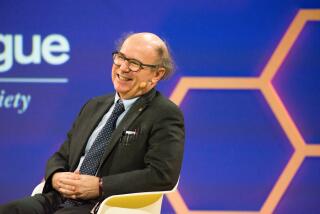Room for Solace in the Absence of Certainty
- Share via
“Everyone understands uncertainty. Or thinks he does.”
So says German physicist Werner Heisenberg in Michael Frayn’s play “Copenhagen,” playing at the Wilshire Theater.
I hate to argue with someone no longer around to defend himself, but I beg to differ. I think most people don’t begin to understand uncertainty, which is why we run from it screaming. What we want, and believe we can have, are guarantees: Is air travel safe? Is the global climate warming? Are we doing the right thing in Afghanistan?
He loves me; he loves me not.
Plucking petals off daisies or reading the stock market ticker, we all want to know for sure.
Alas, our universe is an uncertain sort of place, as Werner Heisenberg discovered. Every bit of certain knowledge comes at the price of uncertainty someplace else.
Take, as Heisenberg did, an elementary particle. Try to pin it down: Where, exactly, is it? To know, you must measure it, and to measure it, you must disturb it in some way. Thus, the minute you pin down its position, you no longer know exactly how it is moving. Conversely, the more precisely you pin down its motion (velocity), the less clearly you can see its exact position.
This apparent limitation to human measurement turned out to be a fundamental property of the universe. Even the vacuum of empty space quivers with uncertainty; in fact, these incessant nervous twitches in nothing may well add up to more energy than everything else in the universe combined.
Frayn’s play, likewise, takes place in a cloud of unanswered questions.
Why did Heisenberg go to Copenhagen in 1941 to see his old mentor, Danish physicist Niels Bohr? At the time, Heisenberg was the head of the German nuclear effort. Did he plan to pry atomic secrets from his friend? Or was he trying to enlist Bohr’s help to try to prevent atomic bombs from being built?
And why did Germany fail to build an atomic bomb? Was it because Heisenberg deliberately withheld information from the Nazis? Or because this consummate mathematician neglected to do an obvious calculation?
Does Heisenberg know himself? Is there a single answer?
Real people, like particles, are complicated. Their states are entangled--with each other, with forces, with history. Physics is entangled with politics and the personal gets entangled with everything. Bohr was entangled with Heisenberg, and so was his physics.
Though Bohr is the acknowledged “father” of quantum mechanics, perhaps his best-known contribution is his theory of complementarity--a set of ideas valued as much by philosophers as by physicists.
Complementary descriptions of nature are required, but paradoxically are often mutually exclusive. Measured one way, an electron is a particle; measured another, it is a wave. To see the wave aspect, you destroy the particle; to see the particle, you destroy the wave.
Nature is full of such dualities. A human being has infinite worth. A human being is merely a collection of electrons and quarks. Music is a mathematical relationship among acoustic tones. Music is a means of emotional expression. Both are true, and neither is complete.
Bohr and Heisenberg too made a complementary pair. Bohr relished paradox. Heisenberg was undone by it.
Bohr wasn’t content unless physics made everyday sense: “What does the mathematics mean in plain language?” asks Bohr in the play. “What are the philosophical implications?”
Heisenberg found truth in equations: “What something means is what it means in mathematics. Mathematics is sense!”
(Yet even Heisenberg finds room for doubt: “Mathematics becomes very odd when you apply it to people. One plus one can add up to so many different sums.”)
The physicists were old friends, like father and son. They were also enemies: Germany occupied Denmark.
Together, they created a physics of deep truth and beauty--physics that gave people (as observers) a central role. Together, they also made possible physics with the power to destroy all people once and for all.
If that were to happen, says Bohr’s wife, Margrethe, in the play, “even the questions that haunt us will at last be extinguished.”
As long as there are people, of course, there will continue to be questions--and the hope for certain answers. And there lies a paradox Bohr would have loved: Faith can be certain, but knowledge is always to some extent elusive. Some answers are like particles--everywhere, nowhere. Different depending on how you ask, or when.
The price of knowledge is not sin but uncertainty. Easier to swallow, perhaps, but far more difficult to comprehend.
More to Read
The biggest entertainment stories
Get our big stories about Hollywood, film, television, music, arts, culture and more right in your inbox as soon as they publish.
You may occasionally receive promotional content from the Los Angeles Times.









